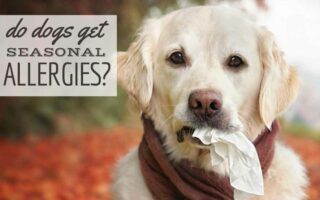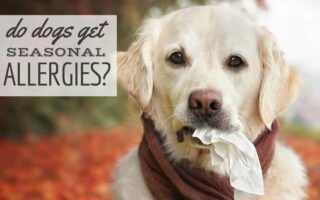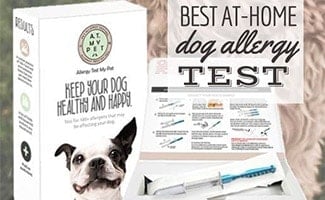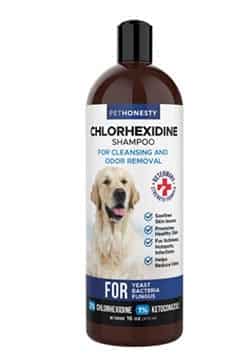
 People often wonder, “Can dogs have seasonal allergies?” The answer is yes; they can. Ranging from mild to quite serious, dog seasonal allergies can occasionally look like hay fever in people. But in reality, the overwhelming majority of dogs with seasonal allergies have very itchy skin. We’ll help you know how to spot the signs and how to treat this common condition.
People often wonder, “Can dogs have seasonal allergies?” The answer is yes; they can. Ranging from mild to quite serious, dog seasonal allergies can occasionally look like hay fever in people. But in reality, the overwhelming majority of dogs with seasonal allergies have very itchy skin. We’ll help you know how to spot the signs and how to treat this common condition.
Article Overview
Contents
What Are Seasonal Allergies?
 In medical terminology, seasonal allergies are part of a complex medical condition called “atopy.” This usually means the body overreacts to such environmental triggers as mold, grass, pollen, or dust mites, to name just a few. These are called “allergens.” In people, atopy often manifests through hay fever, asthma, or eczema. In dogs, seasonal allergies are also a complex issue, but skin issues are by far the most common signs your dog has them.
In medical terminology, seasonal allergies are part of a complex medical condition called “atopy.” This usually means the body overreacts to such environmental triggers as mold, grass, pollen, or dust mites, to name just a few. These are called “allergens.” In people, atopy often manifests through hay fever, asthma, or eczema. In dogs, seasonal allergies are also a complex issue, but skin issues are by far the most common signs your dog has them.
Why Do Dogs Get Seasonal Allergies?
In short, it’s usually genetics. Studies have shown that some breeds and even families of dogs have a less efficient skin barrier and a more reactive immune system than others. Some more susceptible breeds include Bulldogs, Pugs, Retrievers, Setters, and Terriers.
For these dogs, not only can allergens penetrate more easily and more deeply into their skin, but they also cause more severe inflammation. The vicious circle starts with itchy skin, which can become infected and even more sore from all the licking and scratching.
When Is Allergy Season For Dogs?
The word “seasonal” is a bit misleading because both people and dogs can have allergies year-round if they are continually exposed to the offending allergen. This is why you might notice that veterinarians usually prefer to use the term “atopic dermatitis.” This is also why figuring out what’s causing the allergy can be a total game-changer.
Dog Seasonal Allergy Symptoms

A hallmark of seasonal allergies in dogs is that they usually start between six months and three years of age. Some of the signs of seasonal allergies in dogs are similar to hay fever in people, like a runny nose, itchy eyes, eye discharge, sneezing, or coughing. However, this is not nearly as common as in people, and there are many other reasons a dog can have these kinds of symptoms.
Some of these reasons can be benign, like a cold, but some can be more serious. It’s generally best not to assume your dog has seasonal allergies if they have these symptoms. Rather, make sure you talk to your veterinarian to rule out other potential causes.
Most dog seasonal allergies manifest as dermatitis (inflammation of the skin), which usually makes them noticeably itchy. You might see your dog licking, rubbing, chewing, or scratching different parts of his body. Commonly affected areas are paws, ears, face, inner thighs, rear, and tummy. You may notice your pup’s skin getting red and missing fur, or the skin might become greasy, flaky, or even swollen, raw, and bleeding in extreme cases.
Discover The Cause With Dog Allergy Testing
 These same symptoms could indicate additional allergens as well. Therefore, it’s best to rule out all other possible irritants first. Then, if the symptoms persist, consult your vet for allergy testing or consider an at-home dog allergy test.
These same symptoms could indicate additional allergens as well. Therefore, it’s best to rule out all other possible irritants first. Then, if the symptoms persist, consult your vet for allergy testing or consider an at-home dog allergy test.
What Else Can Cause Allergy Symptoms?
The problem with dermatitis and itching is that it is not specific to seasonal allergies. The first thing your veterinarian will want to rule out is whether there might be another more obvious issue going on, like fleas or other skin parasites like mange. Even without an evident infestation, fleas can make dogs very itchy by triggering allergies as well. It’s important to rule this out first, as parasite issues tend to be a lot more straightforward to deal with than allergies.
It can also be tricky to tell the difference when you have seasonal allergies vs food allergies in dogs. They can cause the same symptoms, and some dogs can even have both. It’s essential to get your dog the best help possible, but there may be some degree of trial and error to figure out the specific cause. The best approach is to be patient and methodical.
Dog Seasonal Allergy Treatment

Sadly, allergies are usually a chronic and relapsing problem, and it’s absolutely worth investing time and effort in preventative care. You can control allergy symptoms well, but since atopy is a complex genetic condition, it can be helpful to think of it as something that can be managed, not cured.
There’s no single “silver bullet” seasonal allergy medicine for dogs that works for every dog or in every season. Just like people, dogs can go through relatively calm periods or have nasty flare-ups. The challenge is usually to figure out what triggers the symptoms and what combination of approaches seems to best help each dog. You can then rapidly get on top of flare-ups when they happen.
What Should I Give For Flare-Ups?
Bad flare-ups usually require medication, both by mouth and on the skin, and should involve help from your veterinarian. You might be wondering if it’s safe to give Benadryl for dog seasonal allergies. Unfortunately, by the time he’s showing symptoms, it’s often too late to give your dog antihistamines like diphenhydramine (Benadryl) or cetirizine (Zyrtec). These drugs can occasionally be helpful in some dogs as a preventative; however, if your dog is already showing symptoms, they probably won’t help. It’s best to talk to your vet about the next step instead.
Your vet can determine the best treatment for your dog’s seasonal allergies, but this can take some trial and error with different medications. At first, managing a flare-up can feel quite time-consuming, but take heart: improvement is usually quick. As you and your vet become more familiar with your dog’s triggers and symptoms, you can be better about staying on top of them.
What Can I Do To Manage My Dog’s Seasonal Allergies?
Ongoing management of seasonal allergies by you, the pet parent, is actually the most important part. This is where you can make a real difference through preventative and supportive care. Many veterinary dermatologists would say this is the cornerstone of managing seasonal allergies in dogs.
In a nutshell, these dog seasonal allergy “home remedies” are aimed at reducing exposure to allergens, bathing and moisturizing, and providing a high-quality diet.
Reduce Allergen Exposure
 Reducing the exposure and time of contact between your dog’s skin and the triggering allergens is a game-changer. This is also why veterinarians often recommend allergy testing — if you know what you’re up against, you can learn how to best avoid it. For example, if you know your dog is sensitive to pollen, you might decide to keep him inside and keep your windows closed on days with a high pollen count and only walk him early in the morning or later in the evening.
Reducing the exposure and time of contact between your dog’s skin and the triggering allergens is a game-changer. This is also why veterinarians often recommend allergy testing — if you know what you’re up against, you can learn how to best avoid it. For example, if you know your dog is sensitive to pollen, you might decide to keep him inside and keep your windows closed on days with a high pollen count and only walk him early in the morning or later in the evening.
On the other hand, if your dog is allergic to dust mites, you might find it helpful to keep the windows open and invest in a HEPA filter vacuum. Or if your dog is allergic to grass, you’ll know to never allow him to roll in it and to keep your lawn short, religiously wiping down his paws whenever he comes home from a walk.
Regardless of the causes of your dog’s seasonal allergies, you can take action to help reduce your pup’s allergen exposure. These include keeping his fur shorter, carefully and frequently wiping him down with a damp cloth, focusing on his problem-prone areas, and choosing a dog bed you can wash quickly and efficiently to keep the allergen burden low.
Bathe And Moisturize
 Most veterinary dermatologists say this is another hallmark of how to treat seasonal allergies in dogs. Bathing has multiple benefits, such as mechanically removing the allergens before they penetrate the skin, regulating the production of skin oils, preventing secondary bacterial infections, and helping the skin barrier repair itself. For dogs who suffer from severe skin allergies, it’s often best to use a shampoo and moisturizer prescribed by your veterinarian. Dogs with skin allergies often need several baths a month (if not more) during flare-ups.
Most veterinary dermatologists say this is another hallmark of how to treat seasonal allergies in dogs. Bathing has multiple benefits, such as mechanically removing the allergens before they penetrate the skin, regulating the production of skin oils, preventing secondary bacterial infections, and helping the skin barrier repair itself. For dogs who suffer from severe skin allergies, it’s often best to use a shampoo and moisturizer prescribed by your veterinarian. Dogs with skin allergies often need several baths a month (if not more) during flare-ups.
Dogs with less severe symptoms might do well with a good over-the-counter dog shampoo instead, but you should look at the ingredients carefully. The best dog shampoo for seasonal allergies considers the pH of dogs’ skin, uses gentle cleansing agents (not SLS), and is fragrance- and silicone-free. You might want to consider itch-relief shampoo from PetHonesty.
Good doggy shampoos and moisturizers also usually contain other helpful ingredients with protective, anti-inflammatory, or antioxidant properties, such as vitamins, oatmeal, or ceramide. It’s also beneficial if a moisturizer is rich in omega-3 and omega-6 fatty acids and vitamin E and contains almond oil, hemp oil, or sunflower oil.
Feed Your Pup A High-Quality Diet
Providing your dog with a high-quality diet can also help his skin stay healthy. There’s no single best food for dogs with seasonal allergies, but there are some things you can look for in a good diet.
Consider Supplements
 Studies suggest omega-3 and omega-6 polyunsaturated fatty acids are critical to skin health and repair, and incorporating these into your dog’s diet through whole fish or fish oil supplements is a good idea. PetHonesty offers several supplements, including allergy immunity chews, a skin allergy food topper, and anti-scratch salmon oil. Either way, discuss any supplementation with your veterinarian first to ensure you’re giving the right kind and the right amount.
Studies suggest omega-3 and omega-6 polyunsaturated fatty acids are critical to skin health and repair, and incorporating these into your dog’s diet through whole fish or fish oil supplements is a good idea. PetHonesty offers several supplements, including allergy immunity chews, a skin allergy food topper, and anti-scratch salmon oil. Either way, discuss any supplementation with your veterinarian first to ensure you’re giving the right kind and the right amount.
Your Dog’s Diet Can Make A Difference
As we said above, the ingredients in your pup’s daily diet can boost his overall health, immune system, and help protect him from severe skin reactions. If you and your vet think a dog food change might help your pup’s allergies, you may want to consider a fresh dog food delivery service. Some of these companies can personalize your dog’s food for allergies.
Disclaimer: This website contains reviews, opinions and information regarding products and services manufactured or provided by third parties. We are not responsible in any way for such products and services, and nothing contained here should be construed as a guarantee of the functionality, utility, safety or reliability of any product or services reviewed or discussed. Please follow the directions provided by the manufacturer or service provider when using any product or service reviewed or discussed on this website.